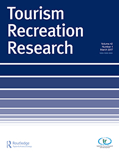
Tourism Recreation Research
Scope & Guideline
Pioneering Research in Recreation and Cultural Studies
Introduction
Aims and Scopes
- Tourism Experience and Satisfaction:
Research on the factors influencing tourists' experiences, satisfaction levels, and their impact on destination loyalty. This includes studies on emotional responses, memorable experiences, and the role of cultural and gastronomic elements. - Sustainable and Responsible Tourism:
A focus on sustainability practices within tourism, including eco-tourism, community-based tourism, and the exploration of environmental impacts and conservation efforts. This area emphasizes the need for responsible tourism practices that benefit both visitors and host communities. - Cultural and Heritage Tourism:
Exploration of cultural experiences, heritage conservation, and the role of local communities in shaping tourism narratives. This includes studies on cultural authenticity, heritage tourism, and the intersection of tourism with local traditions. - Technological Integration in Tourism:
Research on the adoption and impact of technology in tourism, including the use of social media, digital marketing, virtual reality, and mobile applications. This area examines how technology enhances tourist engagement and influences travel decisions. - Crisis Management and Resilience in Tourism:
Investigating the effects of crises, such as the COVID-19 pandemic, on tourism industries and destinations. This includes studies on recovery strategies, resilience building, and the adaptation of tourism practices in response to external shocks. - Social and Cultural Dynamics in Tourism:
Analysis of social factors influencing tourism behaviors, including gender dynamics, cultural differences, and community engagement. This area aims to understand how social interactions shape tourism experiences.
Trending and Emerging
- Post-Pandemic Recovery and Resilience:
A significant increase in research addressing the impacts of the COVID-19 pandemic on tourism and strategies for recovery and resilience. This includes studies on behavioral shifts, recovery models, and the long-term implications for the tourism industry. - Experiential and Emotional Tourism:
Growing interest in the emotional and experiential aspects of tourism, with a focus on how experiences shape tourist engagement and satisfaction. This trend emphasizes the importance of memorable experiences in enhancing destination loyalty. - Diversity and Inclusion in Tourism:
Research exploring issues of diversity, inclusion, and empowerment within tourism contexts, particularly regarding marginalized groups. This includes studies on gender equality, accessibility, and the role of local communities in tourism development. - Sustainable Practices and Eco-Tourism:
An emerging focus on sustainability practices in tourism, with research investigating eco-tourism, responsible travel behaviors, and community-based approaches that prioritize environmental integrity and social equity. - Technology-Driven Tourism Innovations:
Increasing exploration of technological advancements in tourism, such as the use of virtual reality, AI, and mobile applications, which enhance the tourist experience and influence travel decision-making. - Social Media Influence on Travel Behavior:
A rising trend in research examining the impact of social media on travel intentions, destination choice, and tourist behavior, recognizing the role of digital narratives in shaping perceptions of destinations.
Declining or Waning
- Traditional Mass Tourism:
Research focusing on traditional mass tourism models and practices is decreasing, as the field shifts towards more sustainable and niche tourism experiences that prioritize local engagement and environmental responsibility. - Static Destination Marketing:
The emphasis on static marketing strategies for destinations is waning, with a growing focus on dynamic and interactive marketing approaches that leverage technology and social media to engage potential visitors. - Overly Generalized Visitor Demographics:
Studies that rely on broad demographic categorizations without nuanced analysis are becoming less common, as researchers seek more detailed insights into specific tourist segments and their unique behaviors. - Historical Tourism Models:
Research grounded in outdated tourism models that don't account for contemporary changes in traveler behavior and preferences is declining, as scholars increasingly recognize the need for updated frameworks that reflect current trends. - Single-Dimensional Approaches to Tourism Analysis:
The reduction of studies using single-dimensional analytical frameworks is evident, as there is a shift towards multi-faceted, interdisciplinary approaches that encompass the complexities of tourism interactions and impacts.
Similar Journals
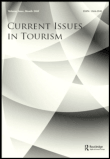
Current Issues in Tourism
Navigating the Future of Travel and HospitalityCurrent Issues in Tourism is an esteemed academic journal published by Routledge Journals, Taylor & Francis Ltd, dedicated to enhancing the understanding of critical issues in the field of tourism studies. Recognized within the top Q1 quartile for both Geography, Planning and Development and Tourism, Leisure and Hospitality Management, this journal occupies a significant position in the academic landscape, with outstanding rankings in Scopus that reflect its impact and relevancy. With its comprehensive scope, covering topics from sustainability to policy impacts, the journal serves as a vital resource for researchers, practitioners, and students alike. Though not currently an open access publication, Current Issues in Tourism encourages the dissemination of innovative research and critical discourse, aiming to advance the field through rigorous peer-reviewed contributions. Since its inception in 1998, it remains committed to publishing timely and impactful articles that address contemporary challenges and opportunities in tourism, ensuring it is an essential reference for those who aspire to contribute to this dynamic discipline.

Tourism and Hospitality Management-Croatia
Empowering Research for Sustainable Tourism DevelopmentTourism and Hospitality Management-Croatia, published by the University of Rijeka, Faculty of Tourism & Hospitality Management, is a distinguished open access journal dedicated to advancing research and practice within the fields of tourism and hospitality. Since its inception, the journal has contributed significantly to the academic community by providing a platform for innovative research that addresses pivotal issues in tourism, leisure, and hospitality management. With an ISSN of 1330-7533 and an E-ISSN of 1847-3377, it boasts an impact factor reflecting its growing recognition, particularly within its 2023 Scopus rankings—placing it at #418 in Geography, Planning and Development, and #104 in Tourism, Leisure, and Hospitality Management. Operating from its base in Opatija, Croatia, the journal encourages submissions that foster a comprehensive understanding of tourism dynamics and hospitality services, offering readers valuable insights into current trends and future directions. As an open access journal since 2011, it ensures wide dissemination of research findings, making significant contributions to the body of knowledge and serving as an essential resource for researchers, professionals, and students alike.
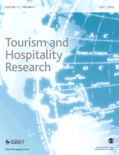
Tourism and Hospitality Research
Connecting scholars and practitioners in tourism research.Tourism and Hospitality Research, published by SAGE Publications Ltd, serves as a premier academic platform for the exploration and advancement of knowledge within the realms of tourism, hospitality, and related disciplines. With an ISSN of 1467-3584 and an E-ISSN of 1742-9692, this journal holds an esteemed position in Geography, Planning and Development (Q1) and ranks in the top quartile for Tourism, Leisure, and Hospitality Management (Q2) as of 2023, reflecting its significant impact in these fields. The journal, operating from the United Kingdom, engages scholars, practitioners, and students by disseminating innovative research that drives the understanding of tourism dynamics and hospitality practices. With its compelling contribution to the academic discourse—illustrated by its Scopus rankings in social sciences and business categories—the Tourism and Hospitality Research journal is an essential resource for those seeking to enrich their knowledge and stay at the forefront of industry trends. Aiming to bridge theory and practice, it not only facilitates scholarship but also informs policy and management strategies worldwide, making it indispensable for anyone involved in the tourism and hospitality sectors.
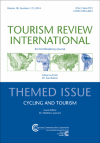
Tourism Review International
Advancing Knowledge in Tourism ManagementTourism Review International, published by COGNIZANT COMMUNICATION CORP, stands as a pivotal resource in the field of Tourism, Leisure, and Hospitality Management. With an ISSN of 1544-2721 and an E-ISSN of 1943-4421, this journal has been delivering insightful research and analyses since its inception. Having achieved a commendable Q3 ranking in the 2023 Scopus category, it holds the 72nd position out of 146 in its field, featuring an engaging array of studies that contribute to understanding contemporary trends and challenges within the tourism industry. The journal seeks to publish high-quality, peer-reviewed articles that offer meaningful insights into tourism practices, policy implications, and innovative strategies, making it essential reading for researchers, professionals, and students passionate about the evolution of tourism. With access options tailored to facilitate scholarly communications and knowledge dissemination, Tourism Review International continues to foster a vibrant academic community dedicated to advancing the discourse in tourism and hospitality worldwide.
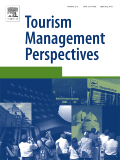
Tourism Management Perspectives
Cultivating Excellence in Tourism Research and PracticeTourism Management Perspectives, published by Elsevier, is a leading academic journal in the field of Tourism, Leisure and Hospitality Management. With an ISSN of 2211-9736 and an E-ISSN of 2211-9744, this journal has rapidly established itself as a key resource for researchers, professionals, and students alike, showcasing high-quality, innovative research aimed at understanding and enhancing tourism practices globally. The journal has consistently achieved a prestigious ranking, currently placed in the Q1 category for its field and ranked 13th out of 146 in Scopus, highlighting its impact with a remarkable 91st percentile standing. As it converges from 2012 to 2024, Tourism Management Perspectives aims to provide a dedicated platform for the dissemination of contemporary ideas, insights, and trends in tourism management, drawing on diverse contributions that integrate theoretical advancements with practical applications. Although it operates as a subscription model, the journal remains accessible to a global audience, ensuring that critical research reaches a broad spectrum of stakeholders.
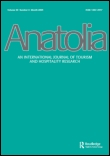
Anatolia-International Journal of Tourism and Hospitality Research
Elevating the discourse in tourism and hospitality studies.Anatolia-International Journal of Tourism and Hospitality Research is a leading scholarly publication dedicated to advancing knowledge in tourism and hospitality management. Published by Routledge Journals, Taylor & Francis Ltd, this journal boasts a substantial impact within its field, holding an impressive rank of #155 out of 821 in Social Sciences and #36 out of 179 in Earth and Planetary Sciences, reflecting its esteemed status in the academic community. With a commitment to the dissemination of high-quality research, this quarterly journal facilitates the exchange of innovative ideas and practices related to tourism and hospitality. Its broad scope enables coverage of various interdisciplinary topics, catering to a diverse range of researchers, professionals, and students. As it approaches its 25th anniversary in 2024, the journal continues to be a vital resource for those seeking to understand and contribute to sustainable tourism and hospitality development globally. While the journal is not open access, it provides valuable insights and research findings crucial for professionals and academics aiming to navigate the dynamic landscapes of tourism and hospitality.

Tourism
Exploring the dynamics of global travel.Tourism is a distinguished academic journal dedicated to the exploration and advancement of knowledge within the fields of geography, planning, and tourism management. Published by INST TOURISM in Croatia, this journal serves as an essential platform for researchers, practitioners, and policymakers from around the globe. It boasts a strong academic reputation, as evidenced by its 2023 quartile rankings—Q2 in Geography, Planning and Development, and Q3 in Tourism, Leisure and Hospitality Management—demonstrating its significant contribution to the disciplines it encompasses. Although it is not an Open Access journal, Tourism promotes rigorous peer-reviewed research that addresses contemporary issues and challenges in the travel and hospitality sectors, making it invaluable for those seeking to bridge theory with practice. The journal continues to shape the landscape of tourism research, encouraging innovative studies that reflect the changing dynamics of the global tourism industry. From its inception in 2002 to the projected coverage through 2024, the journal remains committed to fostering academic dialogue and collaboration.
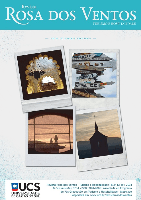
Rosa dos Ventos-Turismo e Hospitalidade
Exploring the Horizons of Tourism and HospitalityRosa dos Ventos-Turismo e Hospitalidade is a leading academic journal dedicated to the exploration of tourism and hospitality, published by the UNIV CAXIAS SUL, PROGRAMA POS-GRADUACAO & TURISMO. Since its inception in 2009, it has maintained an Open Access model, ensuring that researchers, professionals, and students have unrestricted access to quality content. With its commitment to providing a platform for innovative research, the journal aims to bridge theoretical knowledge and practical application within the rapidly evolving tourism and hospitality sectors. Although the specific HIndex and Scopus ranking data are currently unavailable, the journal is recognized for its relevance in fostering scholarly discourse and advancing academic dialogue on pertinent industry issues. Situated in Brazil, Rosa dos Ventos serves as a vital resource for those engaged in contemporary studies related to these fields, offering a diverse array of research articles, case studies, and reviews that reflect current trends and challenges.
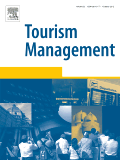
Tourism Management
Leading Insights for Leisure and Hospitality ProfessionalsTourism Management, published by Elsevier Science Ltd, is a leading peer-reviewed journal that serves as a vital platform for researchers, practitioners, and academics in the fields of tourism, leisure, and hospitality management. With a rich history dating from 1982 and an impressive impact factor reflective of its commitment to excellence, the journal is recognized as a Q1 ranked journal across multiple categories in the prestigious Scopus database, affirming its influence and relevance. As the journal embarks on its convergence towards 2025, it continues to address the ever-evolving challenges and opportunities within the tourism sector, offering scholarly articles that provide insights into development strategies, effective management practices, and innovative solutions in transportation and hospitality. Though it currently operates under a traditional publishing model, Tourism Management remains dedicated to advancing knowledge and fostering discourse among its diverse readership, making it an essential resource for anyone seeking to deepen their understanding of this dynamic field.

Advances in Hospitality and Tourism Research-AHTR
Advancing Knowledge in Hospitality and TourismAdvances in Hospitality and Tourism Research (AHTR) is a prestigious peer-reviewed journal published by Akdeniz University, Faculty of Tourism, based in Antalya, Turkey. Since its inception in 2013, AHTR has embraced an Open Access model, providing unrestricted access to its scholarly articles. With an ISSN of 2147-9100 and an E-ISSN of 2148-7316, this journal serves as a vital resource for the global academic community, focusing on innovative research in the fields of hospitality, tourism, and leisure management. Recognized for its contributions, AHTR currently holds a Q3 ranking in both Development and Tourism, Leisure and Hospitality Management, with a Scopus rank placing it in the 53rd percentile in Social Sciences and the 37th percentile in Business Management. The journal invites researchers, professionals, and students to submit their studies, fostering a rich dialogue and the exchange of ideas essential for advancing these dynamic fields. Through rigorous peer review and a commitment to high-quality research, AHTR continues to enhance the understanding and development of hospitality and tourism, making it an indispensable publication for those dedicated to scholarly excellence in these sectors.